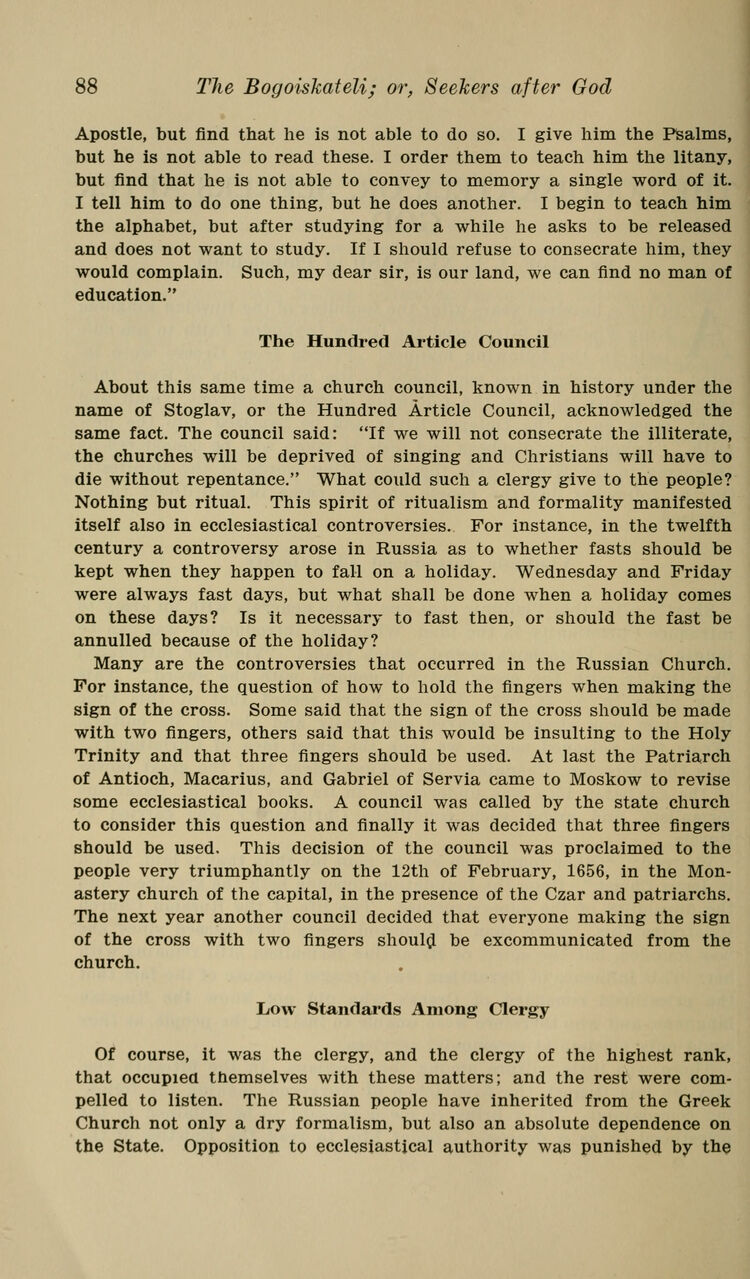
Full resolution (JPEG) - On this page / på denna sida - The Bogoiskateli: or, Seekers After God. Prof. I. V. Noprash - Vladimir Introduced Christianity - The Hundred Article Council - Low Standards Among Clergy

<< prev. page << föreg. sida << >> nästa sida >> next page >>
Below is the raw OCR text
from the above scanned image.
Do you see an error? Proofread the page now!
Här nedan syns maskintolkade texten från faksimilbilden ovan.
Ser du något fel? Korrekturläs sidan nu!
This page has never been proofread. / Denna sida har aldrig korrekturlästs.
88 The Bogoiskateli; or, Seekers after God
Apostle, but find that he is not able to do so. I give him the Psalms,
but he is not able to read these. I order them to teach him the litany,
but find that he is not able to convey to memory a single word of it.
I tell him to do one thing, but he does another. I begin to teach him
the alphabet, but after studying for a while he asks to be released
and does not want to study. If I should refuse to consecrate him, they
would complain. Such, my dear sir, is our land, we can find no man of
education."
The Hundred Article Council
About this same time a church council, known in history under the
name of Stoglav, or the Hundred Article Council, acknowledged the
same fact. The council said: "If we will not consecrate the illiterate,
the churches will be deprived of singing and Christians will have to
die without repentance." What could such a clergy give to the people?
Nothing but ritual. This spirit of ritualism and formality manifested
itself also in ecclesiastical controversies. For instance, in the twelfth
century a controversy arose in Russia as to whether fasts should be
kept when they happen to fall on a holiday. Wednesday and Friday
were always fast days, but what shall be done when a holiday comes
on these days? Is it necessary to fast then, or should the fast be
annulled because of the holiday?
Many are the controversies that occurred in the Russian Church.
For instance, the question of how to hold the fingers when making the
sign of the cross. Some said that the sign of the cross should be made
with two fingers, others said that this would be insulting to the Holy
Trinity and that three fingers should be used. At last the Patriarch
of Antioch, Macarius, and Gabriel of Servia came to Moskow to revise
some ecclesiastical books. A council was called by the state church
to consider this question and finally it was decided that three fingers
should be used. This decision of the council was proclaimed to the
people very triumphantly on the 12th of February, 1656, in the Mon-
astery church of the capital, in the presence of the Czar and patriarchs.
The next year another council decided that everyone making the sign
of the cross with two fingers should be excommunicated from the
church.
Low Standards Among Clergy
Of course, it was the clergy, and the clergy of the highest rank,
that occupiea themselves with these matters; and the rest were com-
pelled to listen. The Russian people have inherited from the Greek
Church not only a dry formalism, but also an absolute dependence on
the State. Opposition to ecclesiastical authority was punished by the
<< prev. page << föreg. sida << >> nästa sida >> next page >>